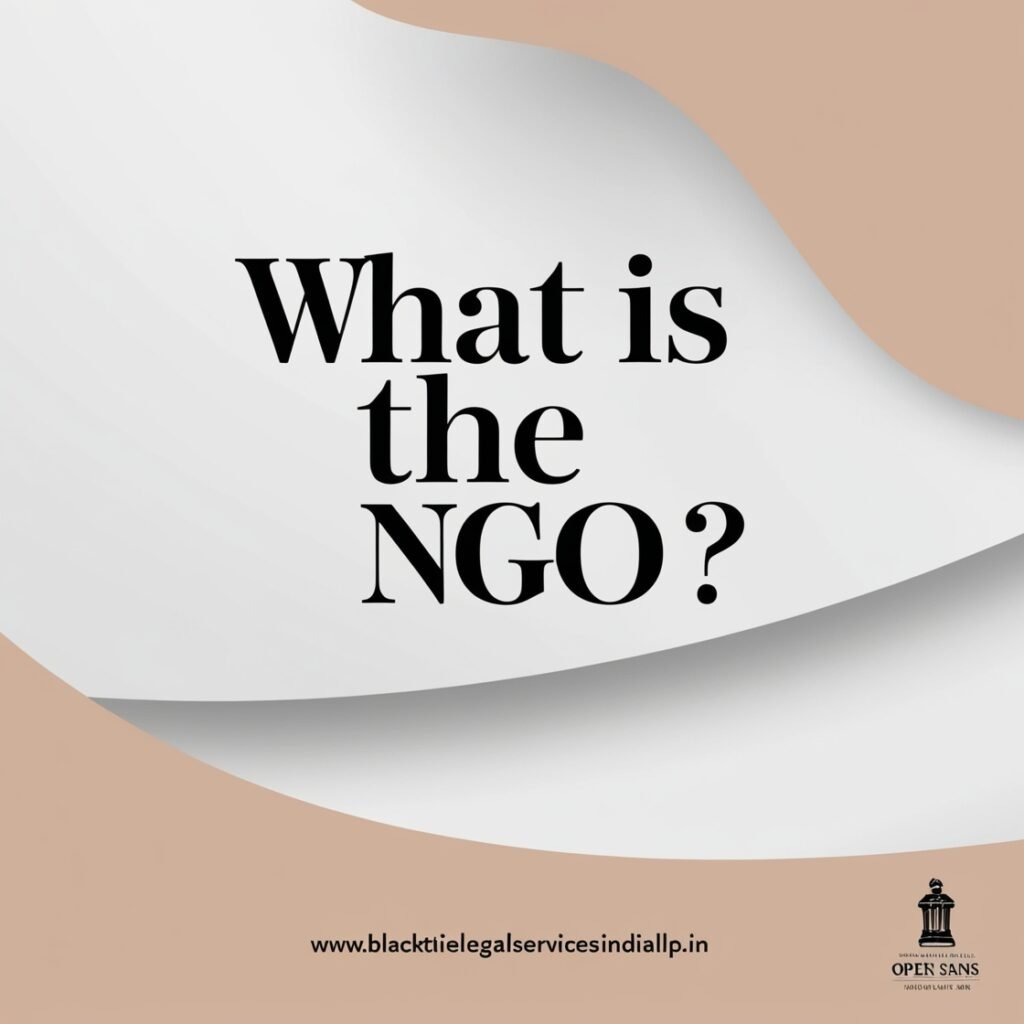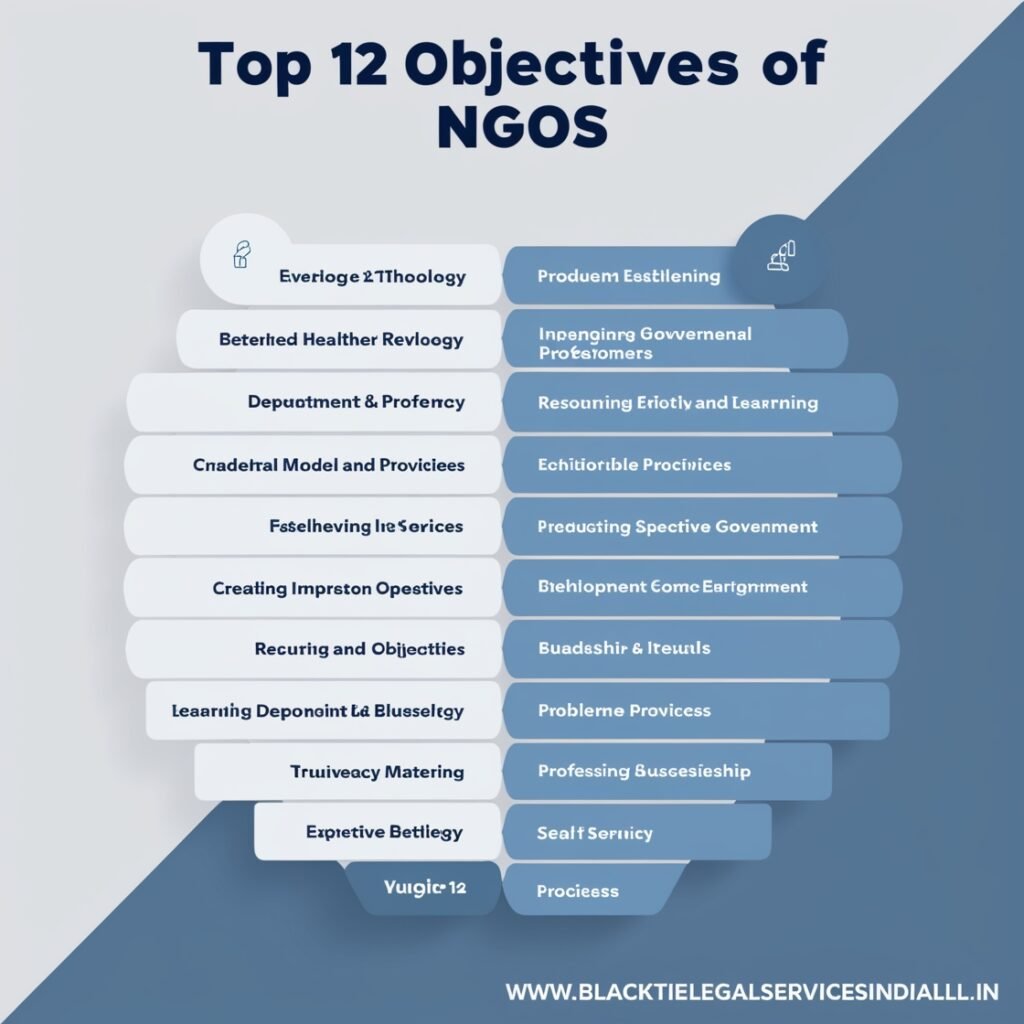Non-governmental organizations (NGOs) have the social responsibility to govern aspects of society with regard to social, environmental, and humanitarian concerns.
Their core function is development and charitable work as they are non-profit organizations that aim to better the living conditions of the least privileged groups of people.
Although the focus and goals of each NGO are common to their area of specialization, the following are common goals of different NGOs.
In this blog post, the main focus will be to review the shared top 12 objectives of NGOs and their role towards sustainable development and social change.
- What is the NGO?
- What is the Importance of NGO?
- What are the Top 12 Objectives of NGOs?
- Community Development
- Endorsing Human Rights
- Advocacy
- Building Capacity
- Environmental Sustainability
- Health and Wellbeing
- Humanitarian Assistance
- Improving Government Performance
- Women Empowerment
- Youth Development
- Education and Literacy
- Promoting Social Justice
- Building Capacity
- Wildlife Conservation
- Labour Rights
- Nutrition and Health
- Health and Wellbeing
- Environmental Sustainability
- Digital Literacy
- Hygiene and Sanitation Conditions
- Social Change
- Improving the Welfare of the Disadvantaged
- What is the Mission of an NGO?
- What is the Vision of an NGO?
- In Conclusion
- FAQs
What is the NGO?

An organization that is non-governmental, non-profit that works independently of any government control and aims to provide essential services to humans, animals, plants and other aspects of life. NGOs can be committed to a wide range of topics, medical care, education, environment and conservation, human rights, community upliftment, etc.
These organizations receive funding from donations, grants and on some occasions international funding to carry out their operations and their goals and objectives usually involve bringing about changes within societies, especially within the most vulnerable people.
What is the Importance of NGO?

Non-governmental organizations (NGOs), also called community-based organizations, play a major role in social, economic and environmental issues. They play a complementary role in areas where governments are not needed, providing social services such as healthcare, education and disaster relief, especially in areas that are otherwise under-served.
Civil society organizations working for human rights, social justice and women’s rights are organizations that promote the rights of marginalized people. It also works towards sustainable development by supporting the provision of education, training and management of resources for communities.
What are the Top 12 Objectives of NGOs?

We have told you all about the 12 objectives of all the NGOs, the name is mentioned along with which all its information is also mentioned below:
- Community Development
- Endorsing Human Rights
- Advocacy
- Building Capacity
- Environmental Sustainability
- Health and Wellbeing
- Humanitarian Assistance
- Improving Government Performance
- Women Empowerment
- Youth Development
- Education and Literacy
- Promoting Social Justice
- Building Capacity
- Wildlife Conservation
- Labour Rights
- Nutrition and Health
- Health and Wellbeing
- Environmental Sustainability
- Digital Literacy
- Hygiene and Sanitation Conditions
- Social Change
- Improving the Welfare of the Disadvantaged
Community Development
NGOs play a central role in community development by advocating for appropriate social amenities such as education, health, and employment.
They engage with people at the grassroots level with the aim of improving their living standards, and values and empowering them economically.
Projects can range from skill building training sessions to equipment provision and construction services that assist in the attainment of community autonomy.
Community Development is the 1st objective among the Top 12 objectives of NGOs and also a very important one.
Endorsing Human Rights
Protecting human rights for all is the main task of many NGOs, as they protect and advocate for human rights. NGOs are fighting for and protecting human rights, such as fighting against child labor as well as supporting freedom of expression. They advocate for marginalized people in society through the use of awareness programs and legal aid.
Endorsing Human Rights is the 2nd objective among the Top 12 objectives of NGOs and also a very important one.
Advocacy
Advocacy is essential in amplifying the voices of marginalized communities. Many NGOs work as advocates for change in policy, social justice and to raise awareness of important issues. They work together with government, mass media, and communities to bring about change within their communities and across the globe.
Advocacy is the 3rd objective among the Top 12 objectives of NGOs and also a very important one.
Building Capacity
Capacity-building programs aim to train individuals and organizations with additional skills that will help them continue their development. Training and sensitization, workshops and seminars, and other forms of mentoring are conducted by NGOs with the aim of empowering communities by educating them and providing leadership skills and tools. This objective is fundamental to building a society that is equipped with the means to protect its interests.
Building Capacity is the 4th objective among the Top 12 objectives of NGOs and also a very important one.
Environmental Sustainability
Environmental concerns have emerged as serious, and NGOs are sometimes at the forefront of advancing sustainability. These include activities such as afforestation, conservation, waste disposal, and the use and development of renewable energy resources. Through promoting action against adverse changes to the climate and putting green solutions into practice, NGOs hope to preserve and protect natural resources for future generations.
Environmental Sustainability is the 5th objective among the Top 12 objectives of NGOs and also a very important one.
Health and Wellbeing
The welfare and well-being of targeted vulnerable groups is the core business of NGOs. They cater to basic medical needs, run mobile clinics, and support health awareness. These ventures focus on social improvement in health by advocating for access to essential healthcare needs and information to people to tackle problems such as malnutrition and diseases, poor hygiene, and sanitation.
Health and Wellbeing is the 6th objective among the Top 12 objectives of NGOs and also a very important one.
Humanitarian Assistance
In most crises, NGOs are usually the first to bring humanitarian aid to the victims. Whether it is a hurricane, war, disease outbreak or famine, they bring food, shelter, clothing and medicines to those in need. Their commitment to humanitarian aid is to alleviate people’s suffering, helping communities restore their human existence.
Humanitarian Assistance is the 7th objective among the Top 12 objectives of NGOs and also a very important one.
Improving Government Performance
Most are associated with NGOs, which work closely with governments in improving the quality of service delivery and governance. This paper shows that through the provision of advice, overseeing operations and demanding disclosure, NGOs have a significant impact on increasing accountability and thus better governance. They support policy reforms that accommodate people and make adequate use of resources.
Improving Government Performance is the 8th objective among the Top 12 objectives of NGOs and also a very important one.
Women Empowerment
The advancement of women is very important for gender equality and social development. Many NGOs are involved in the implementation of programs that are focused on raising young leaders, educational sponsorship, and support of enterprises. Non-governmental organizations also offer constructive activities through their programs where youth are allowed to unleash the change makers in them.
Women Empowerment is the 9th objective among the Top 12 objectives of NGOs and also a very important one.
Youth Development
Investing in youth development is essential for sustainable progress. Many NGOs are involved in the implementation of programs that are focused on raising young leaders, educational sponsorship, and support of enterprises. Non-governmental organizations also offer constructive activities through their programs where youth are allowed to unleash the change makers in them.
Youth Development is the 10th objective among the Top 12 objectives of NGOs and also a very important one.
Education and Literacy
Education is fundamental for societal advancement. NGOs aim to provide quality education including, but not limited to, children from underprivileged communities. What they provide in this regard includes the construction of schools, books, and scholarships respectively. Similarly, NGOs provide knowledge to people so that the latter can be potentially useful to society.
Education and Literacy is the 11th objective among the Top 12 objectives of NGOs and also a very important one.
Promoting Social Justice
Implementing their agenda, NGOs are promoters of social justice and active fighters to rethink the status quo of gender, race, and other types of inequalities.
They support individuals and organizations that bring about change for equal opportunities, support victims of discrimination through legal aid, and participate in the implementation of programs to eliminate stereotypes. Their emphasis on each member of society creates a better and fairly balanced society.
Promoting Social Justice is the 12th objective among the Top 12 objectives of NGOs and also a very important one.
Building Capacity
Strengthening the skills, knowledge, and abilities of individuals and organizations to effectively achieve their objectives. This includes training, resource allocation, and fostering leadership to ensure long-term sustainability and success in addressing social challenges.
Wildlife Conservation
Focusing on the protection and preservation of biodiversity, including safeguarding endangered species and their habitats. Efforts include creating awareness, implementing conservation projects, and promoting sustainable practices to balance development with ecological health.
Labour Rights
Advocating for equitable treatment, fair wages, and safe working conditions for workers across sectors. It also involves fighting against exploitation, promoting gender equality in workplaces, and ensuring compliance with labor laws.
Nutrition and Health
Addressing malnutrition by ensuring access to nutritious food and healthcare services, especially for vulnerable populations. Initiatives focus on education, prevention of diseases, and improving overall dietary habits for healthier communities.
Health and Wellbeing
Promoting holistic health by focusing on physical, mental, and emotional wellness. NGOs run awareness programs, provide medical facilities, and advocate for better healthcare policies to improve quality of life.
Environmental Sustainability
Working towards creating a balance between development and environmental conservation by promoting renewable energy, reducing pollution, and encouraging sustainable practices. Projects include afforestation, waste management, and combating climate change.
Digital Literacy
Reducing the digital divide by providing access to technology and teaching essential digital skills. This empowers individuals to access opportunities, stay informed, and enhance productivity in an increasingly digital world.
Hygiene and Sanitation Conditions
Improving sanitation infrastructure, providing access to clean water, and raising awareness about hygiene practices. These efforts aim to reduce diseases caused by poor sanitation and improve overall public health standards.
Social Change
Driving transformation in societal attitudes, norms, and systems to promote equity, inclusion, and justice. This involves addressing issues like gender discrimination, caste inequality, and systemic barriers to development.
Improving the Welfare of the Disadvantaged
Enhancing the living conditions of marginalized groups by providing education, healthcare, livelihood opportunities, and advocacy for their rights. These initiatives aim to reduce inequalities and empower communities to become self-reliant.
What is the Mission of an NGO?

The mission of an NGO is its primary reason for existing and its main function is to meet defined social, environmental, or humanitarian needs.
It embodies, in mission statements, the mission to bring about a positive impact by providing the needed services, fighting for justice, or supporting vulnerable groups.
The aims of an NGO are operational; a statement that outlines the functions of this organization in society and its individual efforts to address social problems.
Also Read: Section 8 Company
What is the Vision of an NGO?

The vision of an NGO is the ultimate goal of the organization, The objectives of NGOs often focus on creating a world free of poverty, a clean and sustainable planet, and ensuring respect for human rights. These objectives of NGOs serve as a guiding compass for the organization, helping the team and stakeholders work toward improving the quality of life and promoting equality within society. By staying true to the objectives of NGOs, they can effectively drive positive change and achieve their vision.
In Conclusion

NGOs are more central to the changes as they deal with various social, environmental, as well as humanitarian concerns. The objectives of NGOs are to address these issues and foster a more just and less oppressive society for both people and the planet. By focusing on their objectives, which include promoting social justice, environmental protection, and humanitarian support, NGOs strive to create long-term positive impacts.
Through governance and partnerships with communities and other stakeholders, NGOs work toward fulfilling the objectives of NGOs, bringing about change and advancement for millions worldwide. Their dedication to these objectives proves that with collective effort, vibrant and meaningful change is possible.
FAQs
Q1. What is the main objective of a nonbusiness organization?
The main objective of the non-commercial organization is to provide services or support for social, cultural, or humanitarian programs rather than to make a profit.
Q2. What are the aims and objectives of a charity?
The great objective of charitable organizations is to enhance the quality of life of people and conditions within the society through their charitable activities and to collect funds for their activities which aim to tackle some socially significant problems including poverty, illiteracy, disease or environmental pollution.
Q3. What are the three objectives of management?
Here are the three common objectives of management:
1. Maximizing organizational objectives in the shortest possible time.
2. Optimizing employee productivity and well-being.
3. Promoting viability and creativity which is at the core of the organization.
Q4. What are the three common objectives of organizations?
Here are the three common objectives of organizations:
1. As a result, organic growth or expansion of operations.
2. The call center should strive to reach its maximum potential in terms of customer satisfaction.
3. The second is the management of the available resources for the achievement of long-term sustainable financial gains.


Add a Comment